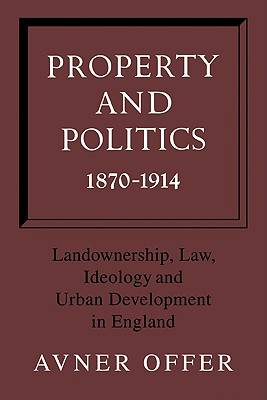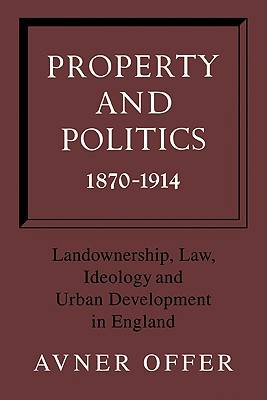
- Afhalen na 1 uur in een winkel met voorraad
- Gratis thuislevering in België vanaf € 30
- Ruim aanbod met 7 miljoen producten
- Afhalen na 1 uur in een winkel met voorraad
- Gratis thuislevering in België vanaf € 30
- Ruim aanbod met 7 miljoen producten
Zoeken
Property and Politics 1870 1914
Landownership, Law, Ideology and Urban Development in England
Avner Offer, Offer Avner
Paperback | Engels
€ 60,95
+ 121 punten
Omschrijving
Landed and urban property exercised a powerful influence on social policy, urban development and national party politics in Victorian and Edwardian England. This book presents an innovative study of the economic, legal and social foundations of the British State. It contains a history of the law of land transfer, estimates of landed property and landed debt, and descriptions of the urban property market and of the impact of taxation upon urban development. Agrarian and urban property owners embraced conflicting doctrines of taxation. These doctrines, held rigidly for many decades, helped to form the identies of the Conservative and Liberal parties, and determine their policies in office. This book also analyses the stormy period from 1909 to 1914 where the urban crisis was compounded of collapsing property values, rising taxes and unsatisfied social demands as well as Lloyd George's provocative budgets and his ambitious and abortive land schemes.
Specificaties
Betrokkenen
- Auteur(s):
- Uitgeverij:
Inhoud
- Aantal bladzijden:
- 464
- Taal:
- Engels
Eigenschappen
- Productcode (EAN):
- 9780521129985
- Verschijningsdatum:
- 11/02/2010
- Uitvoering:
- Paperback
- Formaat:
- Trade paperback (VS)
- Afmetingen:
- 152 mm x 229 mm
- Gewicht:
- 675 g

Alleen bij Standaard Boekhandel
+ 121 punten op je klantenkaart van Standaard Boekhandel
Beoordelingen
We publiceren alleen reviews die voldoen aan de voorwaarden voor reviews. Bekijk onze voorwaarden voor reviews.







